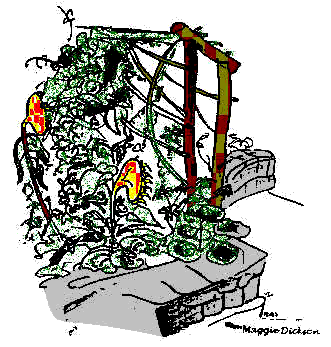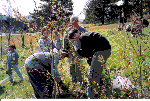Human health and environmental health are intimately linked. Organic gardening and lawn care are vital steps in making our world a healthier place, both for humans and the environment. At the same time the activity of gardening relieves stress. Future plans include a heritage perennial garden, a contemplative woodland garden and possibly a wetland reflecting the presence of the now buried Mud Creek.
The Heritage Community Garden
Seeds of Diversity Canada and the Garden Committee of the North Toronto Green Community brought this dream to life in partnership with Toronto Parks and Recreation with help and encouragement from FoodShare, local community groups, Martin Wade Landscape Architects. And countless volunteers. In 1998, a thriving flower, vegetable and native plant garden was started where previously there had been only a patch of grass. This garden has come to mean many things to many people: a “hands-on” gardening experience for urban dwellers, an educational experience, and a lovely spot to rest and relax in the park with a riot of colour and a host of plant species to please and interest viewers. Those involved learned more about organic gardening, heritage seeds and the magic of composting to provide healthy, chemical-free nutrients for the soil. Workshops for participating gardeners have acquaint them with the permaculture, companion planting, pest management, techniques of plant propagation and the philosophy of naturalization.

The Naturalization Project
The restoration of a section of Eglinton Park’s western slope to native habitat, is the result of a successful collaboration among the North Toronto Green Community, Greenest City, the Evergreen Foundation, and the City of Toronto’s Parks and Recreation. A part of the western slope of Eglinton Park has been replanted with trees and shrubs to provide shade, a gentle, natural landscape, habitat for birds and small animals and a healthier urban environment.

Helen Mills and friends planting here.
The goal of these projects is to create a series of beautiful and sustainable demonstration gardens in Eglinton Park which will:
- Be a peaceful and beautiful sanctuary: The gardens enhance the beauty and visual diversity of the park, providing an ever-changing growing kaleidoscope of colour and growth.
- Educate and stimulate awareness: using gardening methods and educational workshops to teach sustainable organic garden care, seed-saving and plant selection techniques.
- Preserve a living gene bank: The gardens focus on seed-saving and the preservation of genetic diversity in both natural landscape and agricultural and garden plants.
- Make gardening accessible for everyone: Expert or beginner, apartment or house dweller, senior, toddler, the gardens provide opportunities open to everyone.
- Reconnect us to nature: experience nature’s cycles and teach children that carrots grow in the earth, and not in plastic packages at the supermarket.
- Reconnect us to our past: Eglinton Park is a special place with a rich human and natural heritage. The food gardens evoke bygone days when the Huron grew squash and beans along the now buried Mud Creek’s bottom lands. The naturalization site reminds us of Toronto’s former magnificent forests, teeming with wildlife. As we garden discover a profound feeling of a sense of place – our own place.
- Help build our community: Many different people and groups are involved in planning and planting: local residents, members and staff of the community centre, local business-people, seniors and school children.
To volunteer or for more information contact The North Toronto Green Community or Seeds of Diversity. You can also E-mail the garden coordinator at garden@ntgc.ca
